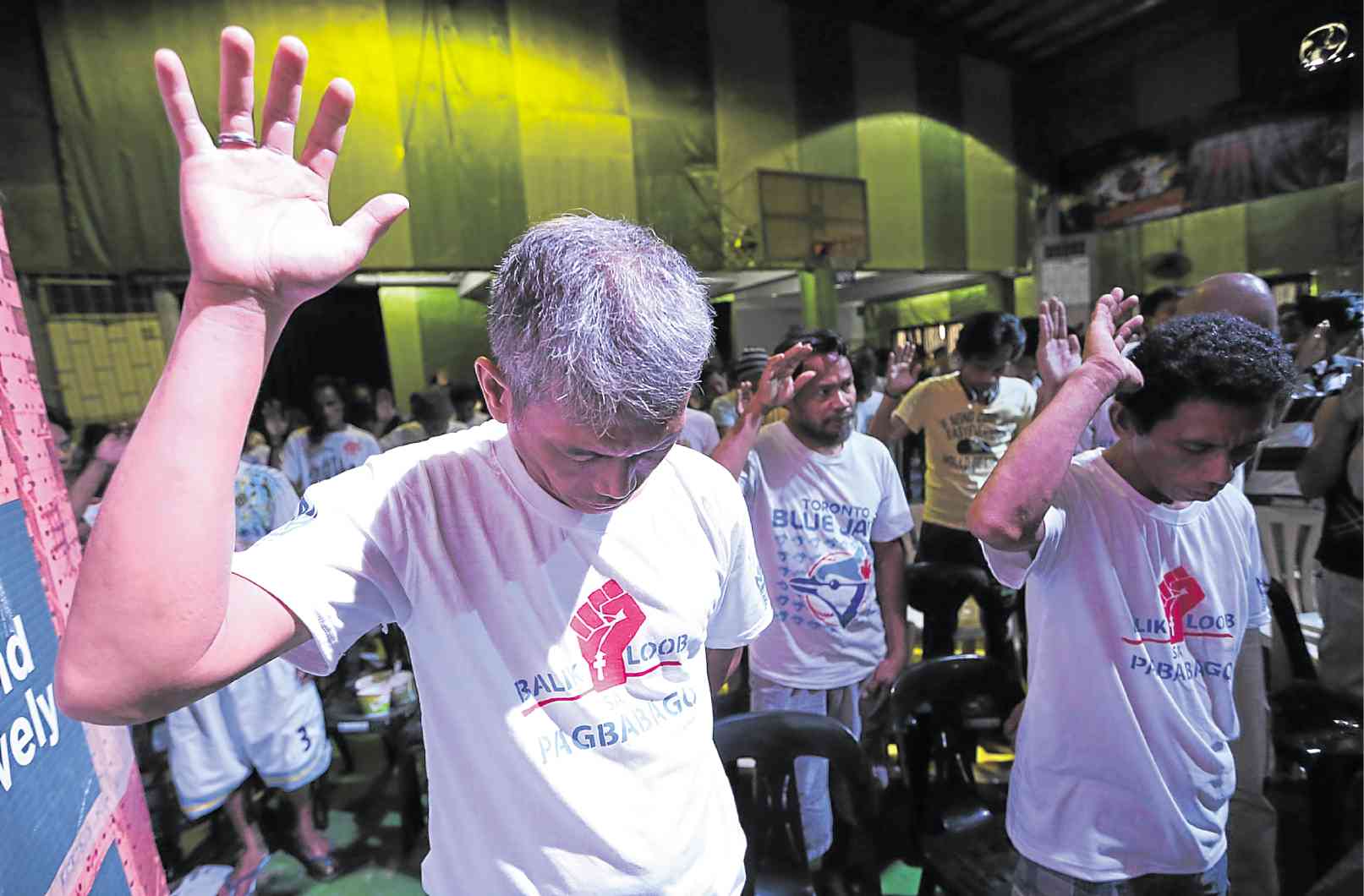Pasig cops use songs, testimonies to convince drug users to change
“PANGARAP ko’y di maabot. Dahil sa bawal na gamot. Akin nang pinagsisihan ang aking kamalian (I could not realize my dream because of illegal drugs. I now regret my mistake).”
These regretful lyrics of “Bawal na Gamot,” a song about the perils of drug addiction, set the tone for a special project of the Pasig City police who on Saturday had its officers sing and jam with close to 600 confessed drug users who had surrendered in droves over the past few days.
Joined by members of the city’s antidrug abuse council and led by their chief, Senior Supt. Jose Hidalgo Jr., the local lawmen gamely led the singing of “Bawal,” “May Bukas Pa” and “Magbago Ka”—classic Filipino pop songs about hope and fresh starts—with hands raised and swinging as the verses flashed on a videoke screen.
“They (the policemen) sang with us like we were friends. I realized we were almost the same, that we shared the same experience and they were also once addicted to something,” said Aldrin Rubio, 45, who joined the chorus with 570 other men at the Community Baptist Church in Pasig.
Rubio said he surrendered on Friday after being hooked on drugs for almost 30 years. “After seeing what happened to my friends—some of whom were killed—I was afraid that I would share the same fate. I got scared of the police,” he told the Inquirer.
Article continues after this advertisementBut last Saturday, Rubio said he saw a different side to law enforcers. “Now, I know I will surrender, not because of fear but because of love. I love my family and I want to restore my broken relationship with my children,” he added.
Article continues after this advertisementSaturday’s program started around
9 a.m. with a magic show, a lecture on illegal drugs, their effects, criminal cases that awaited users and pushers as well as what was expected of them after their surrender.
Hidalgo said the Pasig City government was offering a total drug rehabilitation program with spiritual, social and financial intervention.
Also in attendance was Mayor Robert Eusebio who told the yielding drug dependents to take advantage of the opportunity being given to them by the police, the government and God.
“Some people surrender because they [read in the] newspapers that they will die if they do not surrender. No. You are not surrendering to me. You are changing for yourself, your family. Do it for yourself,” he told them.
“Wala sa Pasig ang pagawaan ng plastic. Kaya ‘wag tayong plastic sa pagbabago natin (We do not have a plastics factory here in Pasig. So let’s be sincere in our desire to change ourselves),” Eusebio said.
The surrenderors, meanwhile, clapped and cheered when Zenaida Concepcion, head of the city’s Anti-Drug Abuse Council, discussed the possibility of the government providing them with scholarships and/or funds for putting up a business should they complete the skills training at the Pasig City Livelihood Center and the drug rehabilitation program.
But what got the audience’s attention were the testimonies of policemen and one of the lecturers who admitted to drug use.
Insp. Roberto Garcia of the Pasig City police station investigation and detection unit and Dr. Rally Abalon, national director of Over Edge Philippines and a very active campaigner against illegal drugs, both admitted to drug experimentation. Both, however, said they successfully kicked the habit.
Digi Antonio, now the executive assistant of the Cainta vice mayor and a member of the Community Baptist Church, also testified on how illegal drugs affected his life.
“I experienced how my father used to take illegal drugs and have pot sessions with his friends in his own room. And I witnessed how he died because of illegal drugs. And I am glad to witness how all of you want change, and how you desire to get away from this destructive vice,” he said.

DRUG surrenderors make a vow to change for the better after a personal—but different—encounter with the Pasig City police. NIÑO JESUS ORBETA
Like a Sunday worship service, the surrenderors were given the choice to turn their lives over to God. Some were intently listening while others were in tears.
Joshua San Pedro, 24, told the Inquirer it was his first time to attend a worship service.
“I know Jesus but only from afar, from my neighbors, but I never felt him. But today, I know He is real. It felt strange,” San Pedro said.
San Pedro, the youngest of six children, started using drugs when he was 22 after his mother died. His father was imprisoned also because of illegal drugs. “I never grew up with a father. Nobody advised me what to do. I did not have a clear direction in life. But now, all I want is to change. I don’t want to stay this way,” he said.
SPO4 Rogelio Baltazar, executive police officer of the Pasig Police and a church volunteer, told the Inquirer: “Our goal really is to bring them closer to God.”
Baltazar said he knows what the surrenderors are going through since he once used drugs himself.
“I thought, what could be the best way to help and rehabilitate them? And that is through getting them closer to God. We are one spirit, soul and body,” he added.
“We (the police) should not be feared. We are all in this together,” he said.